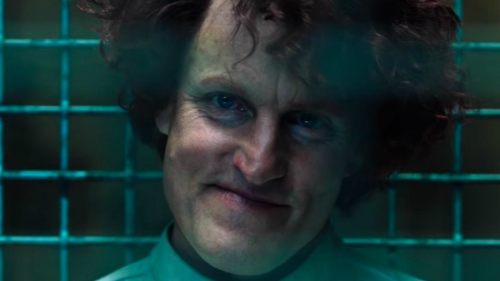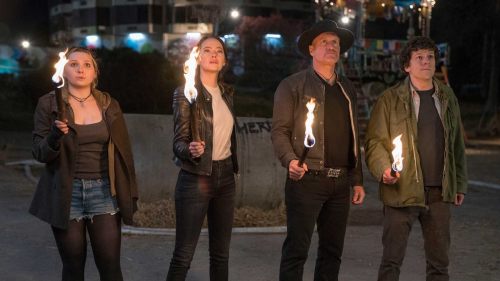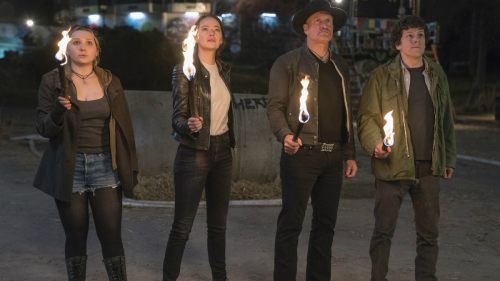NATURAL BORN KILLERS: In Which Love Kills The Demon
Oliver Stone's Natural Born Killers remains just as potent today - in its satire, in its condemnation of the media, in its black humor, in its often shocking acts of violence - as it did upon arrival twenty-two years ago (tangential: we are all getting old as fuck, guys). It's known for all of these things and more, and none moreso than the string of "copycat" killings that occurred in its wake.
For better or for worse, the questions surrounding those killings (namely: "Can the film truly be held responsible for real-life murders?") have become Natural Born Killers' legacy, and everything else that's so wonderful about it has ... well, at the very least, its satire and its bite and its clockwork precision have become underappreciated. At worst, it's mostly been forgotten.
With Wacky Romance month in full swing, I thought it'd be a good time to draw attention to another oft-underappreciated element of Stone's film: the fated romance of Mickey and Mallory Knox. Brought to startling life by two ferocious performances (Woody Harrelson and a never-better Juliette Lewis, respectively), Mickey and Mallory's story is truly one for the ages, worthy of standing alongside the most iconic cinematic relationships. And as fucked up and violent as M&M's romance is, there's something timeless and universal about their brand of crazy love. Indeed, when considered from the right angle, Mickey and Mallory's romance is borderline relatable.
Mickey's meet-cute with Mallory involves, quite fittingly, a meat delivery. He's delivering a sack of ground beef to Mallory's parents, Mallory answers the door, and within seconds Mickey's talking about fate. This moment - delivered via sitcom format (there's even a laugh-track) - is your classic "love at first sight" situation, something I think just about everyone can relate to. One day you're out doing your job, just minding your own business, and suddenly you're standing face-to-face with the person of your dreams. Maybe Mickey or Mallory wouldn't be your cup of tea, but you definitely see how they'd be each other's. It's endearing.
And then Mickey slaughters Mallory's family. With her help. Less endearing, perhaps, but consider the circumstances: Mallory lives with a monstrous, sexually abusive father and a mother who never lifted a finger to prevent Mallory's abuse ("You never did nothin'", Mallory says as she sets the woman on fire). Mickey believes himself to be a White Knight of sorts, swooping in to free Mallory from a terrible home life. His methods are a touch extreme (my man drowns Rodney Dangerfield in an aquarium), but who among us has never vowed to defend a loved one - viciously, if need be? It's psychopathic and criminal and wrong and almost definitely a bit much considering the fact that Mickey starts killing family members within moments of meeting Mallory, but again: you kind of get it.
As Mickey and Mallory's romance plays out, it reaches another relatable milestone: Mickey and Mallory grow bored with one another. Mickey attempts to spice things up by getting a three-way going (this being Mickey Knox, the final third in the equation is a hostage), while Mallory heads out for a no-strings-attached hook-up with a gas station attendant. In both cases, only Mickey and Mallory survive these encounters and - even more tellingly - they end them alone and guilt-stricken. Anyone who's ever strayed in a relationship will see some ugly parallels to the thinking that drove them to cheat, and to the guilt and shame inherent to the experience.
It's not long after this interlude that Mickey and Mallory are captured and shipped off to the sweatiest-looking prison ever captured on film. Locked up separately, the two seem driven crazier than they ever were together. Mickey has shaved his head and come to consider his violent tendencies a sort of hyper-sanity, with every murder a perfectly reasonable response to the socially-accepted violence he sees all around him. Mallory is, well, less eloquent than Mickey; mostly she's just seething in an isolation cell, alternately throwing herself into walls and singing. You look at this couple being kept apart, and you probably recall how maddening it is to be kept away from the one you love by circumstance. As dangerous as they are, you see what's become of them and you sorta root for them to get back together.
And then they do. It takes a prison riot and a whole bunch of murder, but they do.
And against all odds, they live happily ever after: over the closing credits, we see footage of Mickey, a very pregnant Mallory, and two children careening across America in an RV. Have they finally settled down? It's been a while since I've seen the film, but I remember that being the implication. If so, it would lend credence to Mickey's oft-repeated mantra: "Love kills the demon". It's a sweeter outcome than you might expect, given the two hours that precede it.
The goodness of Mickey and Mallory Knox is not up for debate; their methods cannot be reasonably defended. But what might be up for debate is how far removed we really are from them, particularly when we're in love. Take away all the wanton murder, kidnapping, torture, and nihilism, and - like all celebrities - they're just like us.



